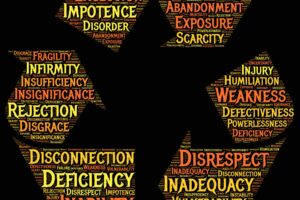As a young Zen monk named Seikan Hasegawa recounted in “The Cave of Poison Grass” [http://www.amazon.com/The-Cave-Poison-Grass-Companions/dp/0915556014]—after tiring at the end of the day while traveling through the mountains, and sleeping in the open—he awakened in the morning with a deadly poisonous snake curled up against him, its neck resting in his open palm. He thought to himself, “I’m not such a busy person” and decided to lie still until the snake left. In a few moments, though, he grabbed the snake and ran screaming to the mountain edge, where he hurled him over the cliff.
This seems a good analogy for the way often we live our lives, hoping for the best until our patience runs out, then doing something drastic, and sometimes regrettable. It may be especially so in the world of work—making a living cooperating and competing with others; working against them, seeing them work against us—for jobs, raises, or just attention and recognition. More and more of the practice discussions I have with members of ASZC and the STO network center around such issues at work, from being between jobs to preparing for retirement and succession. My professional background and Zen practice seem to have prepared me for a special kind of life-coaching.
This article from a recent NYT issue got me to thinking about Hasegawa’s comment, which reflects a traditional Zen attitude that being too busy is a sickness of the mind:
People compete over being busy; it’s about showing status. “If you’re busy, you’re important. You’re leading a full and worthy life,” Burnett says. Keeping up with the Joneses used to be about money, cars and homes. Now, she explains, “if you’re not as busy as the Joneses, you’d better get cracking.”
It may be that now that so many of us enjoy so many of the material goods of life, including multiple cars, and even multiple homes, that keeping—or at least looking—busy may make us look more important, to ourselves as well as, hopefully, to others. How else to explain the endless self-promotion of what turn out to be relatively trivial activities, and temporary minor accomplishments, in social media?
Even as neuroscience is beginning to show that at our most idle, our brains are most open to inspiration and creativity — and history proves that great works of art, philosophy and invention were created during leisure time — we resist taking time off. Psychologists treat burned-out clients who can’t shake the notion that the busier you are, the faster you work, and the more you multitask, the more you are considered competent, smart, successful. It’s the Protestant work ethic in overdrive.
It’s also the profit motive in overdrive. If management is noting and taking names of those who show up on weekends, come in early and stay late on workdays, and more ominously, of those who do not; the new normal at works quickly becomes abnormal, eclipsing what used to be real life, outside the workplace. The ubiquity of constant contact through cell phones and other online devices adds to the always-on hysteria. A life of leisure is more and more relegated to the admired and envied 1%.
This passage reminds me of a great line from the Hsinghsinming, Faith Mind:
To live in the Great Way is neither easy nor difficult but those with limited views are fearful and irresolute the faster they hurry the slower they go
The term hurry is an interesting one to examine thoroughly. In order to do so, of course, we have to stop hurrying for a time. When we are in a hurry, we typically let the details slide, and the devil take the hindmost, attempting to get something done in a shorter time than usual. An old country expression, source lost to memory, comes to mind: Time’s a-wastin’! If we are in a big enough hurry to get out the door, we may forget something and have to return, wasting more time; and even endanger ourselves and others on the expressway, cutting in and out of traffic in a futile effort to beat the clock. Usually, hurrying involves an implicit belief in clock-time, and an overweening urgency attached to consequences of being late. It often turns out that the other parties are even later.
In the Middle Ages, this kind of frenzy — called acedia, the opposite of sloth — was one of Catholicism’s seven deadly sins. But today, busyness is seen as so valuable that people are actually happier when they’re busy, says Christopher Hsee, a psychologist and professor of behavioral science at the University of Chicago. “If people remain idle, they are miserable,” he wrote in Psychological Science in 2010. “If idle people become busy, they will be happier.”
This would seem to beg the question, Busy doing what? Idle in what sense? If we are happier doing just anything rather than apparently nothing, how is this different from obsessive-compulsive behavior, a manifestation of neurosis? The dimension that seems to be missing in this discussion is the idea of “meaningful” work. Or, for that matter, meaningful rest and recreation; or, simply, meaningful focus of attention, and use of time.
Life in the early 21st century wasn’t supposed to be so hectic. In a 1930 essay, economist John Maynard Keynes predicted a 15-hour workweek by 2030, when we’d all have time to enjoy “the hour and the day virtuously and well.” During the 1950s, the post-World War II boom in productivity, along with rising incomes and standards of living, led economists and politicians to predict that by 1990, Americans would work 22 hours a week, six months a year, and retire before age 40.
Well, there’s the danger in selectively projecting limited aspects of the present culture into an imagined future. Especially without taking into consideration the basic weaknesses of human nature. The rest of the story, including unforeseen developments and unintended consequences, is conveniently set aside. We surrender to the enticements of a cultural meme, one that mindlessly places value on behavior, rather than intent.
From a Zen perspective, I suppose that an even more salient observation would be that when a person appears very busy, they may actually be daydreaming, or completely disconnected from their activity in some other way. On the other hand, when someone seems idle, there may be a great deal of activity going on, under the surface. If we judge busyness and idleness based only on what can be seen, the whole notion of productivity becomes trivial. Sitting still, as in zazen, would seem an ultimate waste of time.
From an economic and efficiency standpoint, human beings are less and less valuable as producers. We are increasingly valuable as consumers. Indeed, shopping is considered a form of work (i.e. it is, after all, moving mass through space); or at least a chore, as in getting the daily groceries; and has even become a professional service for those too busy to do their own shopping. So what do we mean by activity, precisely, and by idleness?
Idleness may be regarded as a form of stillness. In Zen, we enter into stillness, ever more profound as the busyness of the monkey mind abates. We discover that within stillness, there is great activity (J. mokurai). The “work” that is done therein is on a meta-level, one that may not be evident to the observer.
This work has to do with the difficult task of coming to recognize the limitations of our own opinions, specifically regarding such concepts as work and play, idleness and action. Matsuoka Roshi would often say, “This is the most your can do.”—indicating zazen. Or he would say, “Stillness is great action.”
Idle hands may be the devil’s workshop, but they are also necessary to innovation and creativity. If we are forever nose-to-the-grindstone, getting things done that we and our bosses consider worthwhile, visible or tangible evidence of our contributions and worth to the company or the community, we may never have the opportunity to see that we are essentially moving stuff from one pile to another. A colleague used to say that he could tell how productive we had been by how full the wastebaskets are at the end of the day. There’s an overworked phrase. What good has all our busyness done, when we find ourselves, finally, at the end of the day?
In the military, digging holes, and then filling them back in, repeatedly, is considered basic training, or used to be. How much of our vaunted activity amounts to this kind of rote, wasted time and effort?
The issue of time, and its use, is not only a concern for business, for which the answer seems to be apparent busyness, but a deeply personal issue as well. How can we feel confident that we are not wasting our own time, as well as that of others? Often, beginners in Zen, and those who never try it, feel that they do not have the time to commit to meditation. This is entirely understandable, but also entirely backward. In the beginning, it is true that rewards from practicing zazen are likely to be incommensurate with the time and effort required to establish a reasonable practice. And by far, the largest group of practitioners are those who start and then stop too soon.
But for those who persevere, the practice of zazen begins to pay back, saving time in the longer run. Holding up the Zen mirror to our everyday busyness begins to expose where and when it becomes bankrupt of meaning; a self-indulgent waste of time; or simply not the most efficient way to accomplish something that really needs doing.
For myself, engaged in design-build projects on behalf of clients with deadlines for most of my professional career, Zen has given me the ability to recognize that I typically do things backwards, the first time around. And there are a lot of first-times-around in the design-build business, as most client needs are unique, calling for a custom solution.
Just knowing—owing to incontrovertible evidence from past experience—that I am probably doing this present project backwards, enables me to visualize how it might be done in a different order, or even to re-examine the client’s basic premise. Obviously, this could result in analysis-paralysis, if this were the only side-effect of meditation.
But Zen also supports the positive notion that our projects are important; at least they are important enough to approach with integrity and due diligence. Otherwise, why do them at all? Your response may be that you really have no choice, as the client, your spouse—or some other pivotal person or influential group in your life—is expecting you to pull through for them; and this present piece of busyness is crucial to that relationship.
This is often true as far as it goes, but it does not actually amount to an absolute need for you or I to finish something if indeed it is a ridiculous imposition on our time and life. We do not actually have to do anything, as long as we are willing and able to face the consequences, both intended and unintended. But this is another discussion. Suffice it to say that Zen can help clarify even the murkiest of these decision-making processes. Instead of sleeping on it, we can sit on it.
When we do sit in meditation, no matter how busy and confused our present situation may appear, it often happens that the clouds part, and we see the movie of our life as if it is actually the movie of someone else’s. From that vantage point, we can see the silliness of our preoccupations, as well as the poignancy of the truly tragic dimensions of life.
Prioritizing our projects and activities as to whether they are important, or urgent; important but not urgent; urgent but not important; neither important nor urgent; is not so easy in the heat of the activity, when everything may seem equally important and urgent. Thus we fall into crisis management and, ultimately, damage control.
If Zen is to survive as a method for lay people to practice, it must be recognized for its ultimately pragmatic value. Zen as a religion has less appeal, and goes head-to-head with whatever other systems, mostly based on beliefs, that may be extant in the culture. Zen meditation helps to cut through the clutter and confusion of the mind, enabling us to live in a complex society, balancing between the demands of the household and the larger community, as well as the needs of the body-mind for our own health and sanity.
No one recommends attempting to “use” Zen meditation for any particular purpose. Its ultimate meaning is too deep and broad to be so defined. We have to leave Zen in its own special place. But the side-effects of its practice can be deep and profound. It is not necessary to set up artificial barriers between the realities of our lives, and the profound relief provided by Zen meditation. Just apply yourself wholeheartedly to Zen and zazen; it will apply itself to your life in a natural way. Don’t be such a busy person.
About Zenkai Taiun M. Elliston, Roshi
Elliston-Roshi began his engagement with Zen in 1966, when he met Rev. Soyu Matsuoka-roshi, founder and head teacher of the Chicago Zen Buddhist Temple (CZBT). He contacted Zen through Rev. Soyu Matsuoka-roshi in the mid-sixties, becoming his disciple in short order, and later founded the Atlanta Soto Zen Center(ASZC) in the 1970s. Elliston-Roshi is the current Abbot of ASZC, which is one of the largest and most active centers for lay practitioners of Zen in the United States today. After two years of training under Matsuoka-roshi’s supervision, and at his suggestion, he underwent a combined Initiation and Discipleship ceremony, and was given the dharma name Taiun, meaning “great cloud.” Later he was given a second name Zenkai, which means “whole world.” In the Zen world, his preferred address is, simply “sensei” (teacher).
You also might be interested in
October 2009 Phase Shift by Zenkai Taiun Michael Elliston The[...]
Memorial Day Sneaks up on you with a bang! What[...]
It is more than a little odd to quote one’s[...]
Search blog posts
Dharma Byte Archives
Categories
Atlanta Soto Zen Center Blog

March 2021 Gassho Newsletter

What Is a Zen Garden?
Recently, I noticed that many people find our website by...

Swords into Plowshares
Photo by Nick Fewings on Unsplash That Old...

Virtual Reality
Virtually real —We see it just as it is,Sitting with fixed...

Memorial Day
Memorial Day Sneaks up on you with a bang! What to remember?...




